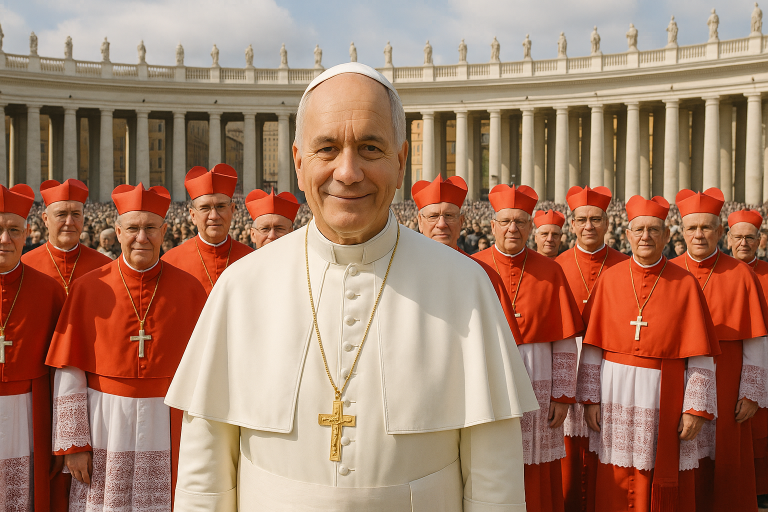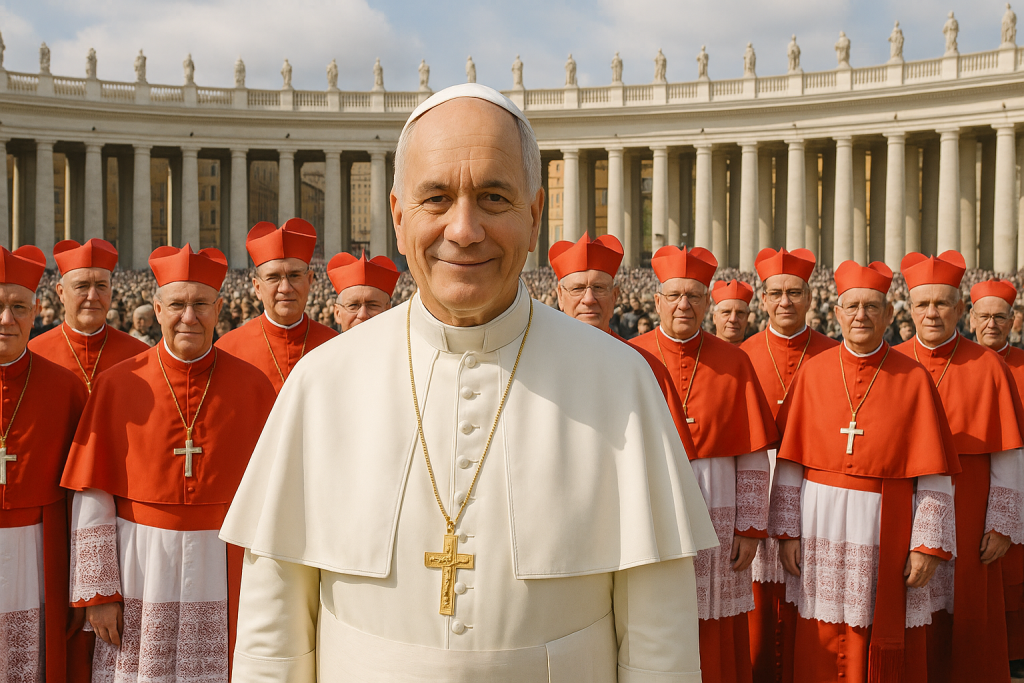
The Catholic world and global observers turned their eyes to the Vatican with the election of Cardinal Robert Francis Prevost as the new Supreme Pontiff, adopting the name Pope Leo XIV. The white smoke billowing over the Sistine Chapel on May 8, 2025, heralded not only a successor to Pope Francis, but the beginning of a new chapter for the Catholic Church, an ancient institution facing contemporary challenges and yearning for direction.
This article explores who the new Pope is, the expectations surrounding his leadership, the possible reforms that could mark his papacy, and how his leadership could impact the more than one billion faithful around the world, keeping a close eye on the nuances that could attract the interest of major advertisers and a vast and diverse audience.

Born in Chicago, United States, in 1955, Robert Francis Prevost, now Pope Leo XIV, brings with him a rich tapestry of pastoral and administrative experience. At the age of 69, he becomes the first North American pope in history, a significant milestone that reflects the growing universality of the Church. His career is notable for his deep immersion in Latin American reality, having spent a considerable part of his religious life in Peru.
This experience on a continent with one of the largest Catholic populations in the world, and with complex social and economic challenges, certainly shaped his perspective and pastoral sensitivity.
Prevost joined the Order of Saint Augustine (Augustinians), a mendicant order known for its focus on community, study and service. His academic background is solid, with studies in theology and a doctorate in canon law from the Pontifical University of Saint Thomas Aquinas (Angelicum) in Rome. Prior to his election to the papacy, he held positions of great responsibility in the Roman Curia, including Prefect of the Dicastery for Bishops, a crucial body for appointing bishops worldwide, and President of the Pontifical Commission for Latin America.
These roles have placed him at the epicenter of the Church’s strategic decisions and have given him a deep understanding of its internal structure and the challenges faced by dioceses globally.
Described by Vatican experts as a man with a “very moderate and discreet” profile, Pope Leo XIV is seen as an intellectual with a great listening ability and a competent administrator.
His familiarity with canon law is particularly relevant at a time when the Church continues to implement and refine legislative reforms initiated by his predecessors, especially Pope Francis. The choice of the name Leo XIV is also symbolic, referring to a line of popes who, at different times, sought to engage with the modern world and promote the social doctrine of the Church, such as Pope Leo XIII, known for his encyclical Rerum Novarum.
Pope Leo XIV’s first words, spoken from the central loggia of St. Peter’s Basilica, were of peace and homage to his predecessor, Pope Francis. By stating “I am a son of Saint Augustine” and expressing his desire to “continue with the blessing” of Francis, Leo XIV signaled an intention to continue with the pastoral line of openness, mercy, and focus on the existential peripheries that characterized the previous pontificate.
His experience as an Augustinian and his long service in Latin America reinforce the expectation of a leadership sensitive to issues of social justice, poverty and inculturated evangelization.
Analysts point out that his experience as Prefect of the Dicastery for Bishops gives him a privileged view of the needs and profiles of episcopal leadership around the world.
He is expected to continue the work of appointing bishops aligned with a vision of a synodal, participatory and missionary Church. His discretion and moderate profile can be valuable assets in navigating the diverse currents of thought within the Church, seeking to build bridges and promote unity in an increasingly plural ecclesial body.
The choice of an American, the first in history, could also have implications for geopolitics and the Church’s relationship with different cultures. Although he spent much of his life outside the United States, his background could facilitate dialogue with the Church in North America, while his deep connection to Latin America allows him to be an authentic voice for the global South. The emphasis on being a “son of Saint Augustine” could indicate a pontificate that values intellectual depth, community life and the relentless search for truth, hallmarks of Augustinian thought.
Every new pontificate carries with it the expectation of reforms, whether pastoral, administrative or doctrinal.
In the case of Pope Leo XIV, speculation has focused on how he will continue the reforms initiated by Francis and what new fronts he might open. His background in canon law suggests he will take a methodical and reasoned approach to any structural changes.
A central area of attention will continue to be synodality, that is, the process of walking together as a Church, involving clergy and laity in decision-making. Pope Francis has strongly promoted this concept, and it is expected that Leo XIV will continue along this path, strengthening mechanisms of consultation and participation at all levels of the Church.
The management of the Roman Curia, the central administrative apparatus of the Church, is also a recurring theme. After the reforms implemented by the apostolic constitution Praedicate Evangelium, Leo XIV will have the task of consolidating these changes and ensuring that the Curia effectively serves the dioceses of the world with a spirit of service and subsidiarity.
Issues such as the role of women in the Church, interreligious dialogue, family ministry, the sexual abuse crisis and the Church's response to climate change and environmental issues (echoing the Laudato Si') will remain on the agenda.
Observers indicate that Leo XIV, although described as moderate, is aligned with Francis's open line. This could mean a pastoral approach that seeks to welcome and accompany everyone, even those in situations considered "irregular" by traditional doctrine, without, however, promoting abrupt doctrinal ruptures.
His experience in Peru, where he faced allegations of abuse cover-ups (which the diocese denied, saying it followed protocols), certainly made him even more aware of the gravity of this scourge and the need for continued transparency and accountability.
The ordination of women to the priesthood remains a sensitive and complex issue, and there is no indication that Leo XIV will promote a change in current doctrine. However, the discussion about expanding the role of women in leadership and decision-making positions within the Church is likely to continue and may gain new momentum.
Likewise, the blessing of same-sex couples, a topic that has generated intense debate under Francis, will require pastoral and theological discernment from Leo XIV to seek ways of welcoming them without compromising the Church's teachings on marriage.
The election of Pope Leo XIV marks a moment of transition and hope for the Catholic Church. His career, which combines administrative experience in Rome with deep pastoral knowledge acquired in Latin America, uniquely positions him to lead the Church in an increasingly complex and interconnected world. We expect a pontificate that will seek a balance between fidelity to tradition and openness to the signs of the times, between doctrinal firmness and pastoral compassion.
For global audiences and advertisers seeking to connect with a vast and engaged audience, Leo XIV’s papacy offers a narrative of continuity and renewal. The key words that will emerge from his pontificate—such as dialogue, synodality, social justice, mercy, and mission—will resonate not only within the walls of the Church but also in the global public arena. Following Leo XIV’s footsteps will be critical to understanding the direction of one of the world’s most influential institutions and the impact of his message on a world thirsting for hope and leadership.